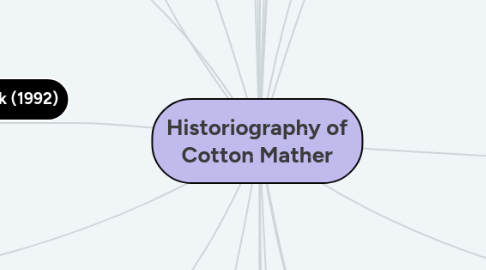Historiography of Cotton Mather
Door Sarah Klenotic


1. Robert Brunkow (1973)
1.1. "An Analysis of Cotton Mather's Understanding of the Relationship of the Supernatural to Man As Seen in History"
1.2. Argues it is the cause of events that happen (329)
2. Charles W. Upham (1831)
2.1. Lectures on Salem Witchcraft & Salem Witchcraft; With an Account of Salem Village
2.1.1. Review by W.F. Poole
2.2. Argues that Mather was in "instigator" in trials (338)
3. W.F. Poole (1869)
3.1. Argues against Upham's claims; believes Mather is complicated and sought balance; tried to redeem the Mather name
3.2. Review of various works
4. Kenneth Silverman (1984)
4.1. The Life and Times of Cotton Mather (1984)
4.2. Makes Mather "understandable, forgiveable"; Struggles to overcome worst traits
5. Albert B. Cook (1992)
5.1. "Damaging the Mathers: London Receives the News from Salem"
5.2. John Dunton, London bookseller, puts down the Mathers name and uses it as a selling point
5.3. Capitalizes on the Mather name; emphazies the nature of trials. Turned public opinion on the manner of the trials (307)
6. David Harley (1996)
6.1. "Explaining Salem: Calvinist Psychology and the Diagnosis of Poessession"
6.2. Feels that the Mathers had a hard time recognizing their mistakes. There were inconsistencies (322)
7. Vernon L. Parringon (1927)
7.1. Blamed Puritinism in general for Salem
7.2. Main Currents in American Thought
8. Rev. Francis Hutchinson (1718)
8.1. An Historical Essay concerning Witchcraft
8.2. Mather failed at treatment of the afflicted girls
8.3. Deborah Kelly Kloepfer "Cotton Mather's "Dora": The Case History of Mercy Short" (2009)
9. George Lincoln Burr (1914)
9.1. Narratives of the Witchcraft Cases: 1647-1706
9.2. Negative viewpoint of Mather; places blame on him for the hysteria
10. George Bancroft (1857)
10.1. History of the United States, III
10.2. Negative view of Cotton Mather
11. Vernon Louis Parrington (1927)
11.1. Main Currents of American Thoughts
11.2. Negative viewpoint, contributed to hysteria
12. Clifford K. Shipton (1933)
12.1. New England Clergy of the 'Glacial Age'
12.2. Sympathetic view of Mather
13. Richard H. Werking (1972)
13.1. "Reformation Is Our Only Preservation": Cotton Mather and Salem Witchcraft
13.2. Asks: Why so active in Salem witch trials?
13.3. Reminder of spiritual world; emphasis on balance (283-286)
14. Wendel D. Craker (1997)
14.1. "Spectral Evidence, Non-Spectral Acts of Witchcraft, and Confession at Salem in 1692"
14.2. Misunderstanding's in Mather's role: does not consider him central in trials (335)
15. Chadwick Hansen (1969)
15.1. Witchcraft at Salem
15.1.1. Review by Stephen Fender
15.2. Argues that Mather tried to temper problem, not exacerbate (257)
16. Thomas J. Holmes (1924)
16.1. "Cotton Mather and His Writings on Witchcraft"
16.2. Argues Mather most likely had little care in the trials (36-37)
17. Josiah Quincy (1840)
17.1. The History of Harvard University
17.2. Agrees with Upham; trials were prolonged by Mather
18. Nathanial Hawthorne (1835)
18.1. John Ronan "'Young Goodman Brown' and the Mathers (2012)
18.1.1. Ronan agrees that Mather encouraged the judges and was a problem in the trials
